The belief that scientific worldviews provide sufficient information and motivation to galvanize widespread action on environmental issues is gaining adherents both within and beyond the academy. The turn to science for materials from which to construct a new cosmology is evident in a variety of emerging movements that go by such names as the Epic of Evolution, The Great Story, the Journey of the Universe, The New Story, and Big History. As environmental problems intensify, proponents of these new cosmologies claim that what is called for is an evidence-based global story and a common ethic. Implicit or explicit in these movements is a conviction that existing religious traditions are too parochial (lacking global appeal) and too far removed from scientific realities and contemporary environmental concerns. Proponents of the new cosmology believe that the physical and biological sciences reveal the distinctly storied nature of our cosmos—a story that belongs to all—and that this cosmic story will inspire wonder and deep concern for the planetary biota, because its core narrative is both universal and true. On this view, scientific narratives can satisfy our deep-seated need for meaning, ritual, and ethical guidance, while firmly grounding us in evolutionary and cosmic realities. The new cosmology thus invests science with mythic, revelatory power; far from disenchanting our world, science is celebrated as a primary vehicle for restoring wonder, meaning, and value.
Can—and should—a scientific account of the universe function as a global myth? If so, what is the likely impact of contemporary scientific cosmologies on established religious traditions and environment-related beliefs and practices?
Many thanks to contributor Lisa Sideris for her assistance in framing this discussion—ed.
Our respondents are:
Whitney Bauman, Associate Professor of Religious Studies, Florida International University
David Christian, Professor of History and Director of Big History Institute, Macquarie University
Willis Jenkins, Professor of Religion, Ethics, and Environment, University of Virginia
Lucas Johnston, Associate Professor of Religion and Environmental Studies, Wake Forest University
Mary-Jane Rubenstein, Professor and Chair of Religion, Wesleyan University
Lisa Sideris, Associate Professor of Religious Studies, Indiana University Bloomington
Bron Taylor, Professor of Religion and Nature, University of Florida
______
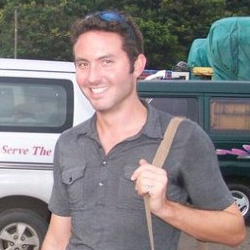 Whitney Bauman, Associate Professor of Religious Studies, Florida International University
Whitney Bauman, Associate Professor of Religious Studies, Florida International University
This is a huge question! If one understands religion as meaning-making practices, and one argues that part of what it means to be human is to be a meaning-making creature, then yes: scientific accounts of the universe play a role in telling us who we are vis-à-vis the universe, other animals, and the rest of the natural world.
However, these stories are not without their own socio-historical locations. No narrative, religious or scientific, can skirt its “locatedness.” Whereas most extant religious stories come to us from an era when peoples were more isolated from one another (relatively speaking) and thus were able to understand their own local story as The Story, the stories from science have been emerging along with the sense of a (global) planetary community—with many different types of peoples—and an increasingly larger and unfathomable universe (with its 13.7 billion years of expansion). This means, of course, that we as humans will find many common grounds in the emerging planetary story—we are all mammals, we come from star dust, we are all homo sapiens, gravity holds for life on this planet, etc.—but this doesn’t mean it is a story that can be The One Story. It will play a role in helping us to understand ourselves as planetary creatures on an evolving planet and an expanding universe, but just as much of the “science” and knowledge from 200 years ago seems odd and outdated, so will the science and knowledge of today seem 200 years from now. We will always have to retell our stories and re-connect with a meaningful world; hopefully, this retelling will be done in a way that includes more and more of the voices of the planetary community (both human and non). This ever-expansive method of knowledge production—from multiple perspectives—highlights the polydoxy of meanings and interpretations of the multiplicity of life rather than confining everything to the lowest common denominator of A Universal Story.
______
 David Christian, Professor of History and Director of Big History Institute, Macquarie University
David Christian, Professor of History and Director of Big History Institute, Macquarie University
As far as we know, all human communities have told origin stories. Whether embedded within dreamtime stories or in the great books of the world religions, these stories summed up the best knowledge gathered over many generations to create large maps of time and space that were full of meaning. These maps lay at the heart of education, providing every member of society with a clear idea of their place in a larger universe.
Modern public education does not offer such a unifying story. Instead, we offer knowledge in shards: a fragment of national history, some chemistry, a bit of mathematics and literature, perhaps a foreign language. To find something more coherent and more meaningful, students have to go to schools that still teach within the religious and cultural traditions of each society. But what they learn there doesn’t align well with the technologies all around them. They will find that there is a profound disconnect between modern scientific understanding of the world and the knowledge embedded within older cultural and religious traditions.
This is dangerous. The French sociologist, Émile Durkheim, wrote a book on suicide in which he argued that the absence of a coherent and credible understanding of your place in a larger universe can create a sense of disconnection, diminution, disorientation, even life-threatening despair. The absence of a modern origin story explains why, for more than a century, philosophers and writers have argued that meaning has fled today’s world.
But that may be too pessimistic. In a sense, we live today in an intellectual building site, watching the slow construction of a new origin story that will sum over the accumulated knowledge of the entire world and offer credible maps of time and space. This origin story is lurking within the vast stores of knowledge generated in the last two centuries. It is immensely rich because it encapsulates knowledge from the entire world; indeed, that may be why it has been so hard to put the story together. But we live now at a turning point in the history of our biosphere, a moment when our own species will determine the future of all other species on earth. So we desperately need to understand how we humans fit into the larger histories of the biosphere and indeed the universe as a whole. We need a modern origin story.
Teasing out that story is the challenge being taken up by scholars and educators in many different countries, under a range of different names, from “big history” to “the Universe story” and “Cosmic Evolution.” We are watching the building of a rich new science-based origin story that will empower us as we face the colossal opportunities and challenges of the next fifty years.
______
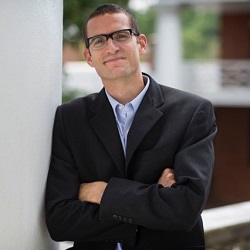 Willis Jenkins, Professor of Religion, Ethics, and Environment, University of Virginia
Willis Jenkins, Professor of Religion, Ethics, and Environment, University of Virginia
Representatives from across the planet are preparing to converge in Paris in a few months to negotiate conflicts over climate change that will shape life on earth for generations. Wouldn’t it help if they shared a common story? And where better to turn for a global myth than disinterested science?
I’m not so sure. Yes, evolutionary cosmology may serve religion-like functions. “When it comes to telling big stories about the order of existence,” says Robert Bellah, “then, even if they are scientific stories, they will have religious implications” (Religion in Human Evolution, 45-6). Science-based accounts of evolution may function as a creation myth, so long as they do not obscure the acts of interpretation that make them so.
But it is not clear to me what we can expect big stories to do for our practical arguments. Evolutionary cosmology underdetermines ecological ethics. It seems equally plausible from a narrative of human emergence from the cosmos that we should engineer our climate and that we must not; that we should manage for a world of 2°C and one of 4°C.
I’m not saying that cosmologies are morally irrelevant. They set existential moods and interpretive contexts. Cosmogonic myths make us meditate on our suspension in the wild cosmos, which should permit ironic perspectives on our parochial identities and political blocs. They can restore humans to wonder before the stars, which seems tonic for souls and societies. Science-based stories may do that as well as conventionally religious narratives or indigenous cosmologies.
There’s just little reason to think that any cosmogony will go far in practically specifying how humans should meet planetary challenges. Paris does not need one true myth; it needs pluralist cooperation to undertake actions about which future generations will tell proud, epic stories.
______
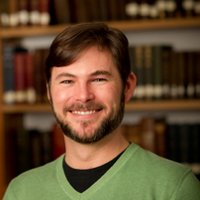 Lucas Johnston, Associate Professor of Religion and Environmental Studies, Wake Forest University
Lucas Johnston, Associate Professor of Religion and Environmental Studies, Wake Forest University
There is a growing body of research that indicates a growing awareness of, and affinity with scientifically informed dark green religious sentiments among both scientists and in popular culture. One concern, though, is that the most significant birth rate increases are occurring in countries where Darwinian science and scientific cosmologies are not widely accepted (the 30 countries with the top birth rates are in Africa, save Afghanistan). Some of these areas are also resource-scarce conflict zones that will feel the impacts of climate shifts first, exacerbating these problems. If most population growth occurs in these areas, and these conflict zones have scant educational resources, it is difficult to imagine how widely environmental ideals or scientific cosmologies can spread.
There is no doubt that the speed and range of the dissemination of Darwin’s ideas in less than 160 years is remarkable. The emergence of scientific cosmologies that advance a reverence for universal unfolding (or evolution) are even younger. So there remains hope. The open question is whether these ideas can spread rapidly enough to promote peaceful socio-cultural transitions and political action (perhaps especially in the aforementioned vulnerable conflict zones) before the effects of climate disruption, natural disasters, pandemics, or other tragic events precipitate dramatic drawdowns in human population.
Although some within the so-called world religions believe that scientific cosmologies inform their own theological interpretations or typical practices, their convictions are often marginalized within their traditions. Much of the lay population of the world’s largest religious traditions remain resistant to such change, and there are many cases in which religious values are trumped by other, often economic, values. In the U.S., evangelical organizations such as Answers in Genesis, or the Cornwall Alliance have been very successful in combating environmental interpretations of their religions and supposedly “pagan” scientific cosmologies.
But other trends, primarily in the industrialized world, are hopeful, indicating an increasing disaffection from these traditional institutionalized religions. Perhaps the best we can hope for is that this flight from traditional religions picks up speed, for despite pronouncements and statements by high profile religious leaders, the most hopeful trends appear outside the mainstreams of these traditions, and among those who have lost their affinities for them.
______
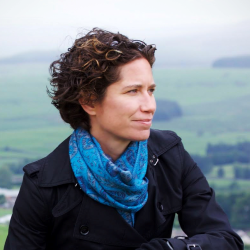 Mary-Jane Rubenstein, Professor and Chair of Religion, Wesleyan University
Mary-Jane Rubenstein, Professor and Chair of Religion, Wesleyan University
It is a tempting thought: if only everyone believed the transcultural truth of our having crawled from the same primal ooze, or burst from the same cosmic blast, we might heed the convulsive warnings of our planetary home. Unlike sectarian myths, the thinking goes, scientific cosmogonies are universal, endlessly inclusive, and, well, correct. So out with the Rigveda, the Dreaming, and Genesis, and in with Charles Darwin, Carl Sagan, and Stephen Hawking: once we can all tell the same story, we can rally behind the same ecology.
I worry, however, that in addition to being implausible, this fantasy is misguided, dangerous, and self-sabotaging. Misguided because the stories modern science tells are not universal; rather, they reflect the particular questions, assumptions, and experiments that produce them (Latour, Stengers, Barad). Dangerous because these hidden perspectives often encode anti-ecological values into scientific stories: the reproductive warfare of some linear biologies, for example; or the anthropocentrism of many emergence theories; or the disposable worlds of most multiverse cosmologies. Finally, the fantasy of a scientific triumph over religion is self-sabotaging because belief in a single, objective truth is arguably the legacy of monotheism in the first place (Nietzsche).
In Cannibal Metaphysics, Eduardo Viveiros de Castro marks the opposition between Darwinian and Amerindian mythologies: the former tells us that humans were once (non-human) animals, whereas the latter tells us that (non-human) animals were once humans. Granted, there is a narrative and even ontological conflict here, but does one side need to “win” before we can pursue, say, animal welfare? Or might it be possible to work toward common ends stemming from different cosmogonies?
If what we value is earthly diversity—of species, ecosystems, ways of living and thinking—then it seems to me we need not one but multiple accounts of that multiplicity, and ought to pursue those political and economic decisions that support their flourishing and proliferation. Difficult and endless work, to be sure, but saner, sounder, and more ecological than yet another effort to convert the whole world.
______
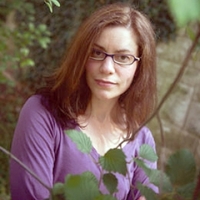 Lisa Sideris, Associate Professor of Religious Studies, Indiana University Bloomington
Lisa Sideris, Associate Professor of Religious Studies, Indiana University Bloomington
The new cosmology (or what I elsewhere call “the New Genesis”) presents a “new” scientific religion, a functional cosmology, intentionally crafted to align with environmental concerns and compete with rival religions. As a mode of appropriating science for grand narrative and mythic purposes, this cosmology is not truly novel. It resembles what Martin Eger has called epic science, whose features include: an extension of the evolutionary paradigm as far as possible (“cosmic” or “universal” evolution); an emphasis on the unification of science and narrative cohesion and comprehensiveness; and uncritical enthusiasm about all that science offers to society—an emerging consciousness, a new morality.
The new scientific story, we are frequently told, changes everything.
Epic science typically coalesces around a single story of evolution often touted as so complete or cutting edge as to suggest that we are in the final frontier, closing in on the final cosmic mysteries. In its totalizing ambition, the new cosmology reaches, paradoxically, toward the eradication of wonder itself. These movements are demonstrably lacking in what John Keats called negative capability: an ability to dwell in doubt, mystery, and ambiguity and to resist the categorization of all phenomena and experience into systematic knowledge. Proffered as narratives that inspire wonder and concern for nature, they actually chafe against uncertainty or open-ended awe.
If wonder is present in these narratives, it appears in disappointingly familiar forms—wonder at humans as the consciousness, heart, or mind of a self-organizing, ever-complexifying universe in which the emergence of our species was implicit from the beginning; wonder at the modern human subject knowledgeable enough to have “discovered” cosmic patterns and processes that were opaque to all previous, unenlightened generations.
The generally anthropic and anthropocentric flavor of the new cosmology constitutes no marked improvement over the human-centeredness that is assumed to taint and disqualify traditional religions as sources of environmental values. New cosmologists sometimes disavow any intent to replace existing faith traditions, but the narrative’s omnicompetent thrust clearly positions it as religion’s superior rival.
At times, attracting converts to “religion 2.0” takes precedence over inspiring care for nature. So preoccupied are epic proponents with valorizing and consecrating science as an all-purpose, meaning-filled religion that nature’s value and wonder are obscured.
This is unfortunate because science already enjoys enormous power and prestige in our society. Nature, on the other hand, could use a little help.
______
 Bron Taylor, Professor of Religion and Nature, University of Florida
Bron Taylor, Professor of Religion and Nature, University of Florida
Scientific cosmologies are increasingly being consecrated, and for increasing numbers of individuals and groups, they provide spiritual meaning and ethical guidance. I documented such religious naturalism in Dark Green Religion: Nature Spirituality and the Planetary Future, and noted as well that some consider such trends to be politically, spiritually and morally perilous. In my book and in an earlier essay at The Immanent Frame, I argued that, although we should always be on the alert for the shadow side of any religion (given their penchant for setting up categories of inclusion and exclusion, purity and defilement, which can have socially divisive and sometimes violent consequences) science-based worldviews are far less likely to have such effects than the world’s predominant religions. This is in part because scientific understandings often produce awe and wonder at the mysteries and beauties of the earth and universe, and a concomitant understanding of its fragility and uniqueness of life on earth. This increases, in my view, the value of the earth’s living systems in comparison to religions that promise divine rescue from the world or its sufferings, or otherwise view it as penultimate, a way-station, or illusory in some way. Moreover, an evolutionary understanding reveals that we human beings share a common ancestor with all other life forms and so we are, quite literally, kin with all life, not just our closest human relatives. Such understandings erode supremacist ideologies, whether racist or anthropocentric. So on those occasions when I engage in normative rather than descriptive analysis, I am not only less worried about the biocultural implications of the spread and consecration of scientific understandings, but I also consider these trends, in general, to be salutary.













I agree with the statement that science takes things apart to describe them; religion puts things together to say what they mean. The new cosmologies do a wonderful job of describing the birth and evolution of the universe; they do not provide a narration of meaning. Humans need both accurate descriptions and modes of meaning-making.
I think Bron draws an unnecessary dualism between benevolent science and fundamentalist religion. The so-called wonder of science has also produced all of our modern capitalist economy, nuclear warheads, fighter jets, bombs, etc. To suggest there is something essential about religion that CAUSES wrongdoing is simply not true. Religion is always embedded in the social and political currents of its time, just like science.
Jason Brown: I did not say what you claim I did; a judicious scholar is careful not to make straw men of the assertions of their interlocutors. Do not ignore qualifiers (such as “in general”). Arguing something is less likely is not the same as asserting some causal connection. You offer a simplistic assertion about the wonder of science producing all sorts of horrors. I could rejoinder that this is at least an overly broad assertion and moreover that while “wonder” might lead to all sorts of concrete responses the ones you mention do not seem obviously connected to this particular affective human experience. Do you have evidence for such a bold assertion?